People of the same trade seldom meet together, even for merriment and diversion, but the conversation ends in a conspiracy against the public, or in some contrivance to raise prices.
Adam Smith, The Wealth of Nations
Former Idaho GOP state chair Trent Clark said something really interesting recently. In a debate with conservative activist Steve Gaston that is now buried in the depths of Facebook, Clark stated that “our current government is beholden to the businesses that are thriving in this political environment.”
I’m not entirely sure whether this statement was meant sincerely or just as a setup for the proceeding statement about the Idaho Freedom Foundation, but in either case it’s very telling. (EDIT: Mr. Clark stated on Facebook that he did not mean it the way I am using it here. Nevertheless it is perhaps a moment of unintentional clarity regarding the influence of big businesses in Idaho politics.)
My definition of the political establishment is a group of politicians and organizations who have found success in the existing system and so they work to perpetuate that same system. Clark is correct that big businesses that have benefited from the current system are therefore invested in maintaining it.
When our federal and state governments were much smaller, businesses invested in themselves by hiring the best workers, training them, and providing them with the equipment necessary to succeed. Today, businesses invest in lobbyists and campaign contributions to shape a government that will pass beneficial regulations or even enact direct subsidies from taxpayers.
Republicans have long believed in free enterprise, rejecting the socialist vision of a command economy. The great Republican president Calvin Coolidge said that the business of America is business and Ronald Reagan often contrasted the wonders of the free market with the inefficiencies of big government. On the other hand, yet another Republican president, Teddy Roosevelt, recognized that when businesses become too powerful, they can infringe upon the rights of the people just as easily as government can.
That is where we are today. Corporations in large part no longer serve the interests of the public, or even of their customers, rather they are in thrall to the high priests of ESG and DEI which prioritize left wing indoctrination over creating useful and profitable products. American companies also have no qualms about outsourcing jobs to China, India, or other developing nations to save a few pennies, and some have even forced American workers to train their foreign replacements. Many of the same companies fired workers for not wearing masks or taking experimental vaccines.
In many cases, big corporations pose an even greater threat to freedom than the government, as the government uses these companies to do what it cannot. The Twitter Files revealed how intelligence agencies worked within social media platforms to censor speech and shape narratives, such as when Facebook and Twitter refused to allow anyone to share the Hunter Biden laptop story.
Closer to home, we see how the Idaho Department of Health and Welfare essentially functions as the marketing arm for Big Pharma, once again blurring the line between government and private enterprise.
It’s no surprise that conservatives have become skeptical of big businesses. Nevertheless, as Trent Clark said, our current government remains beholden to them.
In 1953, General Motors President Charles Wilson, who had been nominated as Secretary of Defense by President Dwight Eisenhower, said, “For years I thought what was good for our country was good for General Motors, and vice versa.” This came only a few years after the federal government partnered with big corporations like GM to produce the machinery that won World War II. Today, many Idaho politicians might well say that what is good for Micron is good for Idaho, and vice versa.
If anything, Clark understated how invested Idaho businesses are in the arena of government. Big corporations and coalitions spend a tremendous amount of money on campaigns, PACs, and lobbying. At the center of this confluence of money and politics is the Idaho Association of Commerce and Industry (IACI), a lobby group representing many big and small businesses in the Gem State.
Both Clark himself and Governor Brad Little are past chairmen of IACI, so they naturally see the lobby as a friend and ally. Little even spoke at the most recent IACI Public Policy Conference in Twin Falls. IACI opposed the Coronavirus Pause Act of 2022, so Little dutifully vetoed it, appealing to Republican principles of limited government:
I am vetoing this legislation because I am a lifelong advocate of limited government, and Senate Bill 1381 significantly expands government overreach into the private sector.
On the other hand, Little has not seen a tax break, subsidy, or regulatory carve out that he didn’t like, which calls into question his belief that government should not overreach into the private sector. If telling businesses they can’t fire employees for refusing an experimental vaccine is not okay, why is it acceptable to pass legislation to transfer your tax dollars to the same businesses?
Last session’s House Bill 24, the Idaho Launch Grant, is the latest example. Under this bill, high school graduates will be given $8,000 from taxpayers to spend on college or workforce training for certain in-demand careers. Which careers are considered in-demand? Why, those determined by the Workforce Development Council, made up of legislators and business leaders appointed by Governor Little. It was no surprise that IACI lobbied in favor of H24. Why pay to train your own workers if you can get the taxpayer to do it for you?
It’s absolutely fair to say that the Launch Grant is a transfer of money from the taxpayer to big business special interests using high school graduates as the bagmen.
Senate Bill 1211 was even more blatant. This was an appropriations bill that covered $146 million in cash transfers between different government accounts, including $15 million into the Workforce Development Council for semiconductor manufacturing. This, you see, is how they get away with giving money directly to certain corporations without specifically naming them, by using such narrow definitions so as to only fit one company. This bill was a direct transfer from the taxpayer to Micron, and a significant return on investment for IACI’s contributions to candidates, PACs, and lobbyists.
Scroll through the Sunshine reports for the governor, legislative leadership, and the PACs that support them and you’ll see massive donations by nearly every big corporation and corporate association in Idaho. This is apparently how business is done these days.
H24 only passed the House by one vote, which surely has IACI and their friends concerned that the gravy train might come to an end should a few more fiscal conservatives win in 2024. In fact, H24 failed to win a majority of the Republican caucus in either chamber, and S1211 only passed the Senate with Democratic support, which might explain why IACI has begun endorsing Democrats for the Legislature.
I don’t know if this is something they’ve done in the past, but it’s very revealing about the true nature of Idaho politics. Casual observers assume that we are a solid red state, since the Legislature has four Republicans for every Democrat, but if you look closer you’ll see that we are fairly evenly split with regards to ideology. IACI’s endorsements bring that split into plain view.
When you look at party labels, the split in Idaho’s Legislature is 87-18 in favor of the Republican Party. However, if you consider the 56 candidates who have thus far been endorsed by IACI as the establishment party, then it looks very different:
That number might continue to grow if IACI announces additional endorsements leading up to the May primary.
Their endorsed candidates run the gamut from far left Democrats such as Reps. Sonia Galaviz and Chris Mathias to moderate Republicans like Sens. Geoff Schroeder and Abby Lee. That means that IACI has implicitly endorsed abortion, transgender surgeries for minors, and everything else on the Democratic platform, in addition to the subsidies and endless growth of government that they truly desire.
To put it another way, IACI would rather have a Democrat who supports abortion until birth, radical racial and gender curricula in schools, and irreversible drugs and surgeries for children than a Republican who votes against more tax breaks and subsidies for its member businesses. So long as the money keeps flowing, IACI is happy.
Many organizations score lawmakers based on how they vote. Establishment figures like to complain about IFF’s Freedom Index or the American Conservative Union’s CPAC ratings but groups like IACI do the same thing. In fact, Ron Nate made a compelling argument earlier this year that IACI’s rating system was garbage compared to the twelve point rubric IFF used. For reference, here is how IACI scores bills in each legislative session:
Last year, IACI used lawmakers’ votes on a mere nine bills to generate their scores, which consistently negatively correlate to scores from more liberty minded organizations like IFF, the ACU, and the recent report from the Institute for Legislative Analysis. Brent Regan, chairman of the Kootenai County GOP, recently posted a graph on Twitter showing the correlation between IACI scores and IFF scores for the 2022 session. It clearly shows that there is a solidly pro-government party consisting of all the Democrats and a good number of Republicans, while the remaining Republicans range from conservative to moderate:
This is the essence of the so-called uniparty, the bipartisan alliance of establishment versus the people. Many, though not all, IACI endorsed Republicans are content to let the left call the shots on social issues so long as they can work together to grow government. The most important thing for the IACI party is to keep money flowing from taxpayers to their own coffers.
IACI has thus far endorsed 65 lawmakers and candidates through their Idaho Prosperity Fund PAC. Here is a quick and dirty list, with incumbents highlighted in grey:
Remember these names, because this is Idaho’s establishment party. Not everyone on this list is necessarily a bad person, or even a bad legislator, but these are the people IACI believes will support their agenda.
IACI recently hosted nine of the challengers on that list at their office in Boise for a fundraiser. The organization clearly hopes to wipe out last year’s conservative gains in the next primary and expand their control of the Legislature.
Trent Clark is absolutely right to say that our current government is beholden to the businesses that have flourished under its umbrella. The question is, what are we the people going to do about it? Should we simply accept that what is good for Micron is good for Idaho, and vice versa? Or should we stand up and say that big businesses, while they have roles to play in our society, should not control our government?




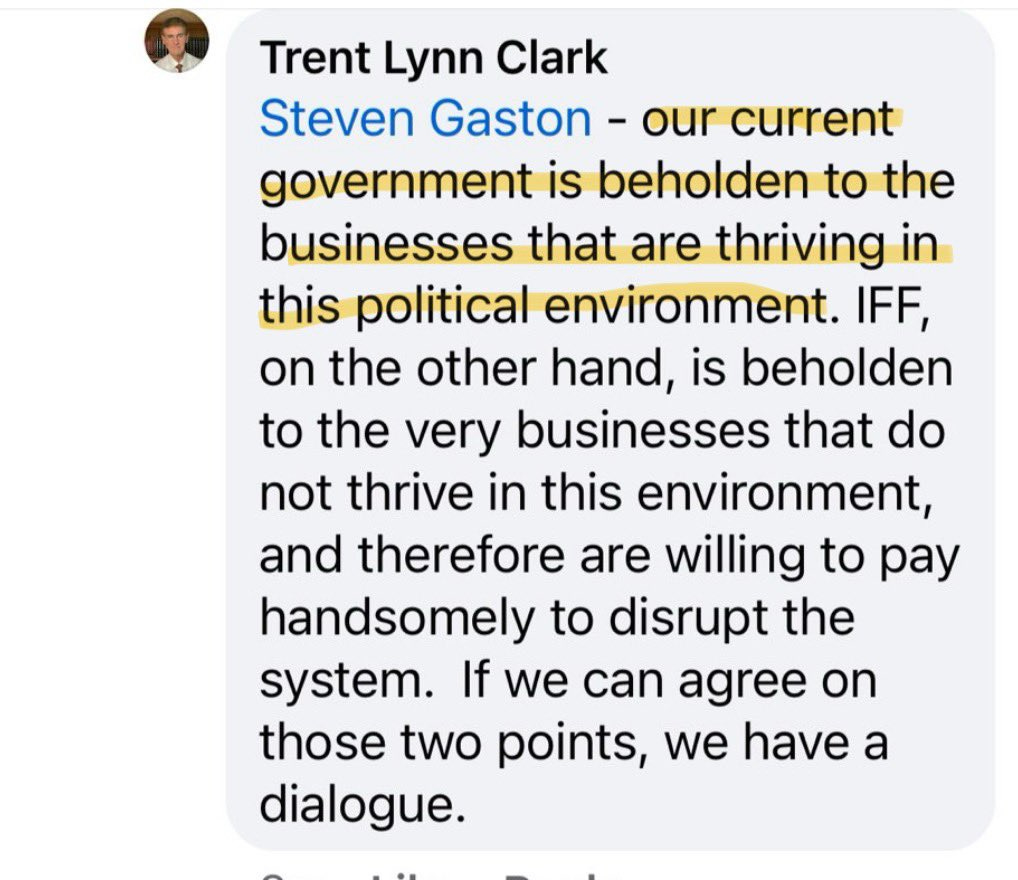
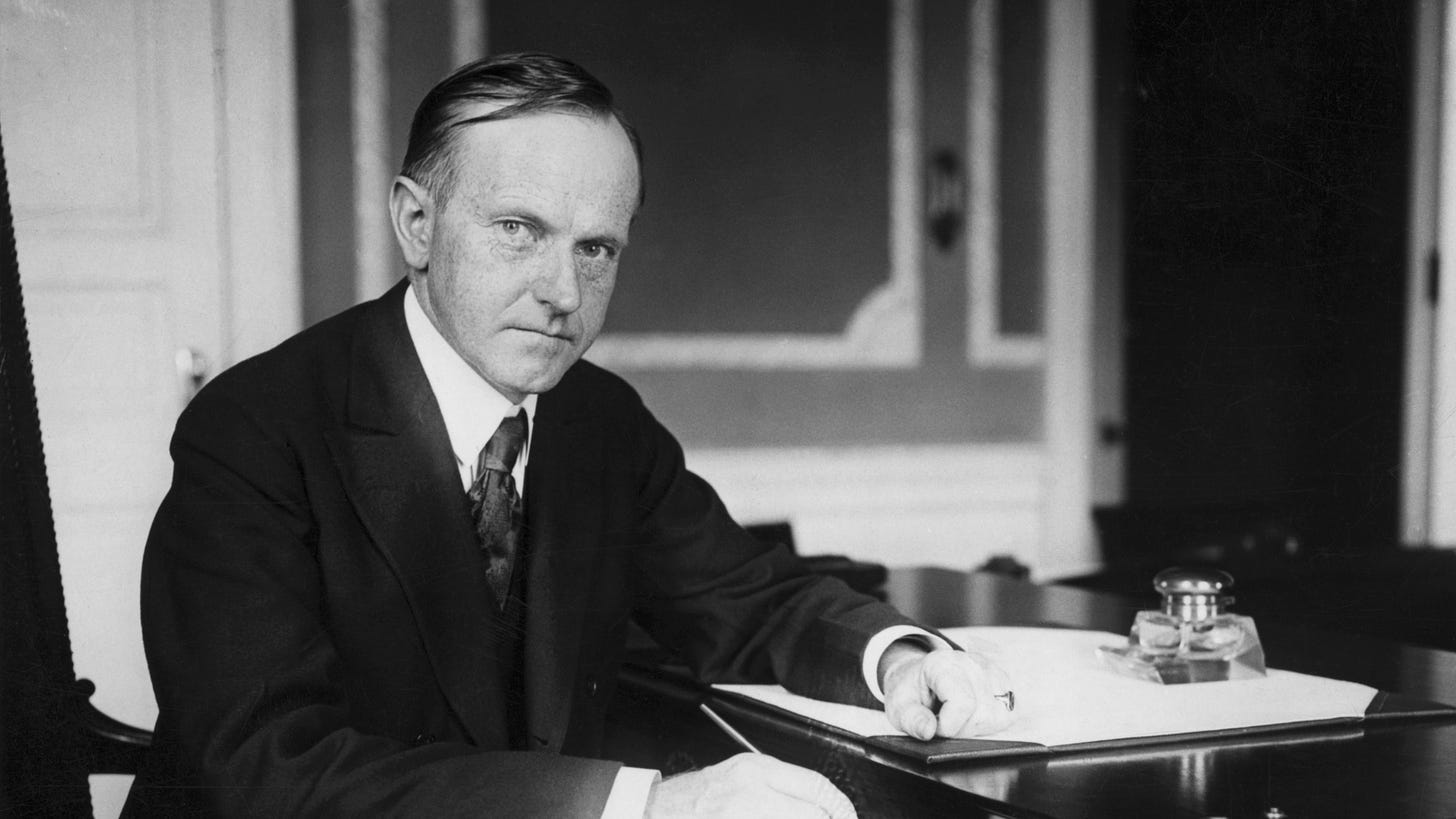


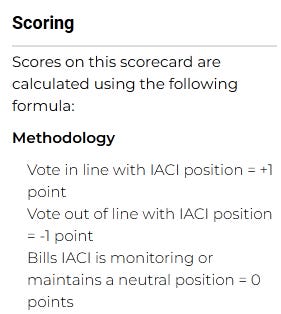


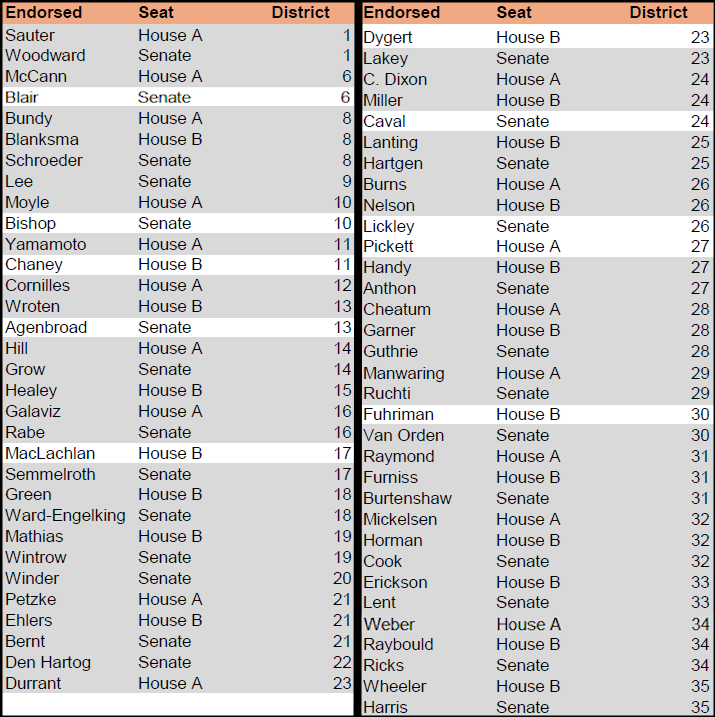
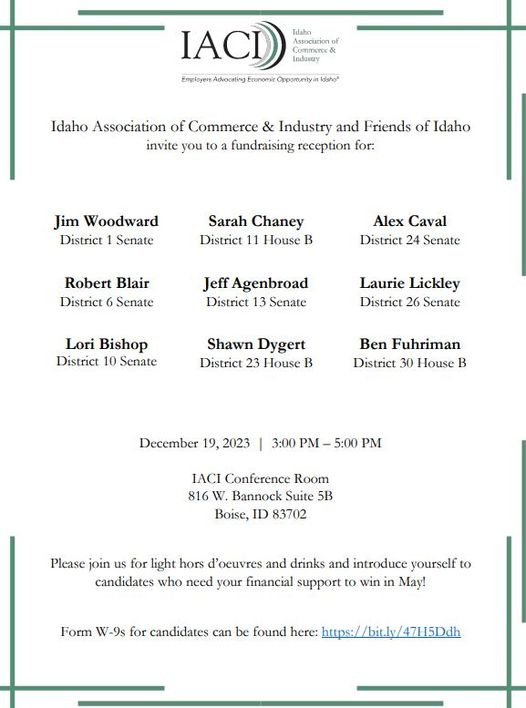
Another outstanding article highlighting the forces within Idaho. My take the moral of the story is if a candidate is endorsed by IACI then vote the other way unless proven otherwise. BTW missed in the highlighted list is Rod Furniss of District 31 endorsed recently by IACI. Every reason to look at his challenger Karey Hanks to replace him.
This needs to be shared on Next door platform. Many that boycotted FB, now use the Next door, but it also censors, just have to try to get some things thru.